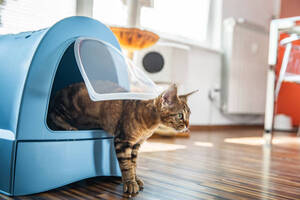Why Does My Cat Play in the Litter Box?
الجسم
Cats are mysterious and intriguing creatures, known for their unique behaviors that often leave us scratching our heads. Among their many odd habits, playing in the litter box can be one of the most baffling. While we typically associate the litter box with a purely functional purpose, cats may see it differently. To truly understand this peculiar behavior, it’s essential to consider a combination of instinctual drives, environmental factors, emotional needs, and even potential medical issues.
The Role of Instincts in Litter Box Behavior
Cats are guided by powerful instincts that influence their daily activities. The litter box, with its loose substrate, is reminiscent of the soft earth that wild cats dig in to bury their waste. For some cats, this behavior extends beyond practicality into playfulness.
Digging as an Ingrained Behavior
In the wild, cats dig to hide their scent from predators or rival cats. This natural digging instinct is not only practical but can also be satisfying. When your cat engages in vigorous digging or rolling in the litter box, they may be fulfilling an ancient behavioral urge. To them, the texture and movement of the litter provide an irresistible sensory experience.
Mimicking Hunting Skills
For kittens and younger cats especially, the litter boxs can serve as a stage for honing their hunting instincts. The act of pouncing, swiping, or even “attacking” the litter is a playful way to simulate catching prey. This kind of behavior is particularly common in energetic kittens who turn almost anything into a game.
Stress and Emotional Triggers
Cats are creatures of habit, and any disruption to their routine or environment can cause stress. Playing in the litter box may serve as a coping mechanism or a way for your cat to seek comfort.
Using the Litter Box as a Safe Zone
The litter box is often in a quiet, low-traffic area of the home, making it a natural retreat for cats. If your feline feels threatened or overwhelmed, they might gravitate toward the box as a private, familiar space. Playing in it could be their way of self-soothing.
Reacting to Environmental Changes
Have you recently moved, introduced a new pet, or rearranged furniture? Cats are highly sensitive to changes in their surroundings. Any of these changes can trigger stress or anxiety, prompting your cat to spend extra time in the litter box. This behavior may signify an attempt to establish control over at least one element of their environment.
Multi-Cat Dynamics and Resource Competition
In households with multiple cats, the litter box can become a focal point of territorial disputes. Playing in the box might be your cat’s way of marking their territory or asserting dominance. Even if there’s no visible conflict, your cat might feel the need to stake a claim, and playing in the litter box could be part of this behavior.
Attention-Seeking Behavior
Cats are intelligent animals that quickly learn which actions get a reaction from their owners. If playing in the litter box consistently earns your attention, your cat might repeat the behavior.
Testing Boundaries
Similar to toddlers, cats are experts at pushing boundaries to see what they can get away with. If you react strongly to their litter box antics, they might interpret this as a game or an effective way to interact with you.
Addressing Loneliness or Boredom
If your cat isn’t receiving enough stimulation or playtime, they may resort to unusual behaviors, such as playing in the litter box. This can be especially true for indoor cats that lack the variety of stimulation they’d experience in the wild.
Medical Factors That May Contribute
While behavioral causes are often the culprit, it’s crucial to rule out medical issues if your cat’s litter box behavior changes suddenly or becomes obsessive.
Urinary Tract Issues
Conditions such as urinary tract infections (UTIs), bladder stones, or cystitis can make your cat associate the litter box with discomfort. If they’re lingering in the box or playing with the litter, it might be their way of processing the confusion or frustration caused by these medical issues.
Parasites and Skin Irritations
Parasites like worms or fleas can cause itching and irritation, prompting your cat to scratch excessively or roll around in the litter boxes. If your cat’s litter boxes play is accompanied by other symptoms, such as weight loss or a dull coat, a visit to the vet is essential.
Overstimulation from Scents
Cats’ noses are far more sensitive than ours. Even if the litter box doesn’t smell appealing to you, your cat might be drawn to the combination of scents it contains. They may play in the litter as a way to immerse themselves in their territory’s unique aroma.
Boredom and Lack of Enrichment
Cats are intelligent and need regular mental and physical stimulation to stay content. A lack of enriching activities can lead to unusual behaviors, such as turning the litter box into a playground.
Creating Fun Out of Necessity
If your cat doesn’t have access to toys or interactive play, they may view the litter boxes as an unexplored realm of possibilities. The digging, shifting, and scattering of litter can provide entertainment in the absence of more appropriate outlets.
Energy Levels and Breed Tendencies
Some breeds, like Bengals and Siamese cats, are particularly high-energy and require extra stimulation to prevent boredom. These cats are more likely to engage in unconventional play, including in the litter boxes, if their energy needs aren’t being met.
Territorial Instincts and Scent Marking
Cats are territorial animals, and the litter box represents an important part of their domain. Even if your cat isn’t marking with urine, their behavior in and around the litter box can serve as a way to reinforce their claim.
Comfort Through Familiarity
The litter boxes carries your cat’s scent, which can be comforting and reassuring. Playing in it might be a way for them to immerse themselves in something familiar, particularly if they feel uncertain or stressed.
Behavioral Reinforcement
Repeated play in the litter boxes can become a habit if it’s not addressed early. The more your cat enjoys or finds comfort in the activity, the more likely they are to continue.
Preventing and Redirecting Litter Box Play
If your cat’s litter boxes antics are becoming problematic, there are several ways to redirect their behavior and address underlying causes.
Provide Enrichment and Stimulation
Ensuring your cat has access to a variety of toys, scratching posts, and climbing opportunities can reduce boredom and redirect their energy. Puzzle feeders or interactive toys are particularly effective for engaging your cat’s hunting instincts.
Maintain a Clean Litter Box
A clean litter box is less likely to attract prolonged attention. Scoop it daily and consider switching to a different type of litter if the texture or smell seems to be part of the appeal for your cat.
Create a Calming Environment
If stress or anxiety is driving the behavior, focus on creating a stable and soothing environment for your cat. Provide hiding spots, maintain a consistent routine, and consider using pheromone diffusers to promote relaxation.
Address Multi-Cat Tensions
In multi-cat households, ensure there are enough litter boxes for each cat—the general rule is one box per cat, plus one extra. This reduces competition and territorial disputes.
Consult a Veterinarian
If you’re concerned that medical issues might be contributing to your cat’s behavior, consult a veterinarian. Early detection and treatment of health problems can prevent them from escalating.
Conclusion
Cats playing in the litter box can seem puzzling, but the behavior often stems from instinct, environmental factors, or emotional needs. By understanding the underlying reasons, you can take steps to address the behavior and ensure your feline friend’s well-being.
Looking for a way to keep your cat entertained and comfortable? Consider investing in a cat tunnel bed! These multi-functional beds provide a cozy hideout for your feline friend while satisfying their playful instincts.










تعليقات